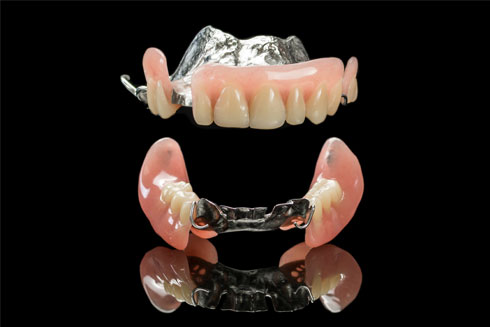
Partial Dentures
Partial dentures are designed to replace one or more missing teeth in the mouth. They consist of a base made of acrylic, flexible resin or metal, which supports the replacement teeth, as well as clasps or attachments that anchor the denture to the remaining teeth in the mouth. Partial dentures made prior to having teeth extracted are known as immediate or interim dentures. These will need to be relined or replaced after healing.
Partial dentures are typically used when a patient has lost one or more teeth but still has some healthy teeth remaining in the mouth. They can help improve a patient’s ability to chew and speak, as well as enhance their overall appearance and confidence.
If you are interested in getting partial dentures, you can come and see us without a referral. We work closely with your dentist and other members of the dental team to evaluate your oral health and determine the best course of treatment for your individual needs. Where possible we intra oral scan your mouth to create a custom-fitted denture that is comfortable and secure. We will also provide a plan on how to care for and maintain your denture and mouth to ensure everything stays healthy.
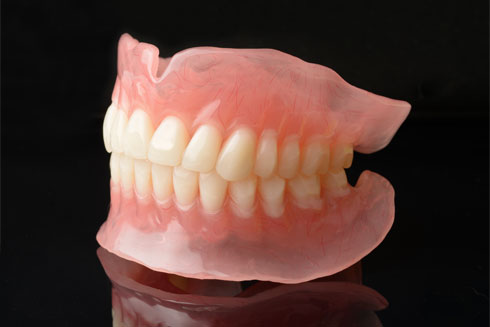
Complete Dentures
Complete dentures replace all of the missing teeth in one or both jaws. They are typically made of acrylic resin and are designed to fit snugly over the ridges and soft tissues of the mouth to restore the appearance and function of natural teeth. Complete dentures made prior to having teeth extracted are known as immediate dentures. These will need to be relined or replaced after healing.
The process of making complete dentures typically involves multiple appointments with us. We work closely with you, assessing the health of the mouth and determining what is needed to create functional and great looking dentures. We use scanning and 3D printing technology together with traditional methods which ensures the best possible results.
It is important for patients with complete dentures to maintain good oral hygiene, as well as to having regular checkups to monitor the fit and function of the dentures, and to detect any potential problems in the mouth.
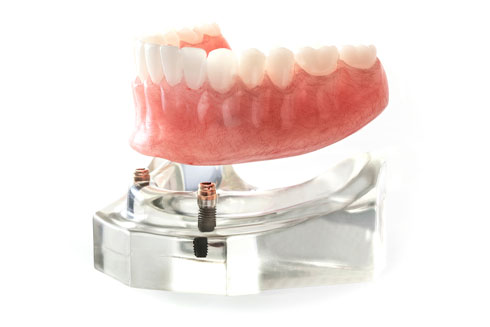
Implant Retained Overdentures
Implant retained overdentures utilise dental implants to support and secure a removable denture. Unlike traditional dentures, which rely on suction to stay in place, implant retained overdentures are anchored in the mouth by implants, providing a more stable and secure fit.
The dental implants used in implant retained overdentures are typically made of titanium and are surgically placed into the jawbone. Once the implants have fully integrated with the jawbone, which can take several months, the overdenture is attached to the implants using special abutments.
Implant retained overdentures can be used to replace a full arch of missing teeth or just a few missing teeth. They are often recommended for patients who have experienced significant bone loss in their jaw due to missing teeth, as the implants can help to prevent further bone loss and maintain the structure of the jaw.
If you are considering implant retained overdentures, we can discuss your options, and refer you to a suitably qualified dental practitioner who can evaluate your oral health and determine if you are a good candidate for the procedure. We can also provide you with more information about the benefits and risks of implant retained overdentures and help you determine if they are the right dental solution for your needs.
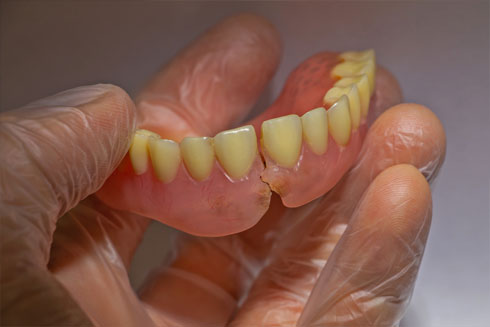
Denture Repairs
Over time, dentures may become worn, cracked, or broken due to regular wear and tear or accidental damage. In such cases, denture repairs can be performed to restore their functionality and appearance.
The process typically involves removing any damaged or broken parts of the denture and replacing them with new ones. In some cases, the denture may need to be relined or re-adjusted to ensure a comfortable fit. It is important to seek prompt denture repair services as damaged or ill-fitting dentures can cause discomfort, irritation, and even lead to further oral health problems.
We can fix broken, cracked, or damaged dentures promptly and effectively. We recommended you contact us to schedule an appointment.
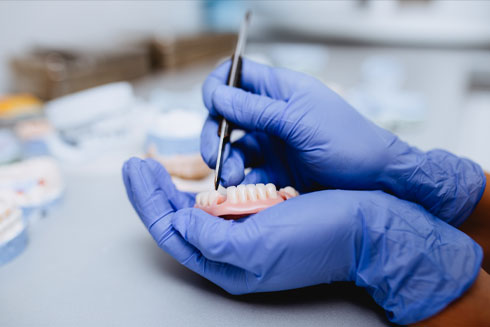
Denture Additions
Denture additions are a type of dental service that involves the addition of new teeth or other materials to an existing denture. This can be necessary for several reasons, such as if you have, or are going to loose additional teeth since your initial denture was made, or if the denture has become worn or damaged over time.
The process of adding new teeth or materials to a denture typically involves taking an impression of the patient’s mouth to ensure a proper fit. We will then add new teeth and/or materials to the denture.
It’s important to note that while denture additions can be a useful way to extend the life of an existing denture, they may not always be the best solution for all patients. In some cases, it may be more appropriate to replace the denture entirely in order to ensure optimal fit, comfort, and function.
If you are considering denture additions, it’s a good idea to speak with us and we can help you understand your options and determine the best course of treatment for your needs.
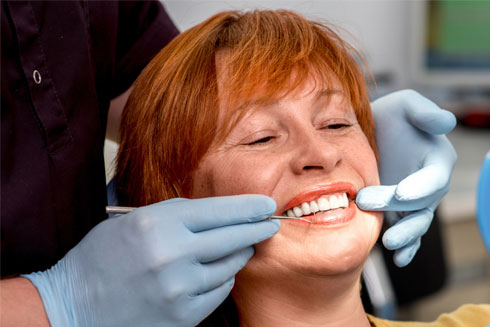
Denture Relines
Denture relining involves adding new material to the underside of a denture to improve its fit and comfort. Over time, the shape of the gums and underlying bone can change, causing dentures to become loose or uncomfortable. Relining can help restore the fit of dentures and improve their function.
It’s important to note that denture relines may not be suitable for all denture wearers. If the denture is severely worn or damaged, a new denture may be necessary. Additionally, if the underlying bone has changed significantly, other dental procedures may be needed to improve the fit of the denture. We can help determine if denture relining is the right option for you.
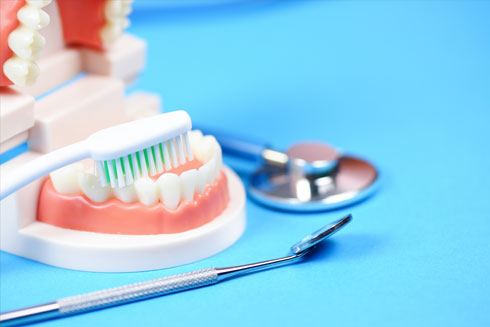
Denture Cleaning
Denture cleaning is an important part of general oral hygiene for all denture wearers. Over time, dentures can accumulate plaque, stains, bacteria, and food particles that can cause bad breath, gum irritation, and even infections. Regular denture cleaning is essential to maintain good oral hygiene and prevent oral health problems. Daily cleaning of natural teeth and your denture is important, we encourage regular check ups with your dentist for your remaining teeth, and we also offer a professional denture cleaning and polishing service when the cleaning gets beyond you.
A daily cleaning regime can vary for each person and it is best to do what works for you in conjunction with advice from your dental practitioner.
When it comes to cleaning dentures, we recommend:
Brushing: Dentures can be brushed with a soft-bristled brush and non-abrasive denture cleaner or mild soap and water. Toothpaste can be used sparingly with a soft bristled brush, as long as it doesn’t cause scratching to the denture teeth and surfaces.
Soaking: Dentures can be soaked in a commercial denture cleaning solution to remove stubborn stains and bacteria, follow the manufacturer’s instructions for the recommended soaking time. An alternative is a mixture of water and white vinegar.
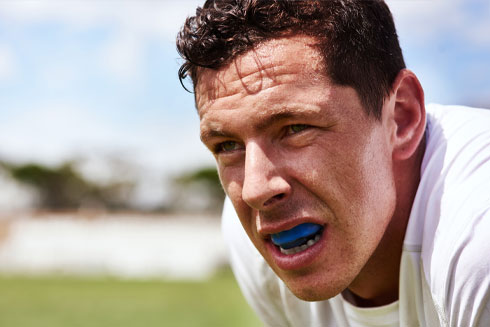
Custom Laminated Sports Mouthguards
Sports mouthguards are designed to protect the teeth and mouth from injury during athletic activities. They are made from a flexible, thermoplastic material that is moulded to fit the individual’s teeth and gums.
We make custom laminated sports mouthguards that offer the best protection and fit. They are tailored specifically to the individual’s teeth and mouth by using intra oral scanning and 3D printing, so no more “Yucky Impressions”. We offer an exciting range of colours and designs for all ages and all sports.
Custom laminated sports mouthguards are particularly important for high-contact sports such as AFL football, rugby, hockey, boxing, and martial arts. We also recommend them for other sports such as basketball, soccer, mountain bike riding, and extreme sports.
In addition to protecting the teeth and mouth from injury, mouthguards may also help to prevent concussions by cushioning the impact of a blow to the jaw or head.


